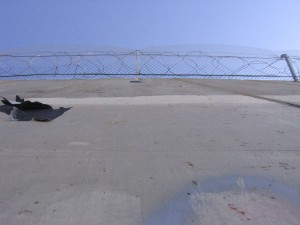
Israel imports palm fronds from Gaza for Sukkot
Maan News Agency, September 30, 2009
Yesterday the Minister of Defense, Ehud Barak, approved the immediate importation of palm fronds from the Gaza Strip to Israel, according to the Hebrew daily Ma’ariv. The move came at the behest of Minister of Religious Services, Yakov Margi, who feared that a shortage of palm fronds and a local monopoly on the item would send prices skyrocketing for the Jewish holiday Sukkot.
For the weeklong holiday, many Israelis build a sukkah (literally booth) using palm fronds for the hut’s roof. The temporary shelter is constructed in remembrance of the forty years that, according to religious tradition, the ancient Israelites wandered in the desert.
Minister Margi reportedly thanked Minister Barak for the decision, stating that it would keep the prices of palm fronds down and would preclude local merchants from overcharging customers.
The department of the Coordinator of Government Activities in the Territories (COGAT), along with the Ministry of Religious Services and the Ministry of Agriculture, will be responsible for implementing the export of the palm fronds from Gaza, despite the ongoing Israeli blockade of the Gaza Strip.
Since the siege began in June of 2007, Israel has prevented movement of goods in and out of Gaza, devastating the Strip’s economy. Under the blockade, Palestinian farmers in Gaza have found themselves unable to export their crops—leaving the strawberries, cherry tomatoes, and flowers that would ordinarily fetch revenue on the international market to rot in the Strip.
Israel’s decision to import palm fronds from Gaza comes just two weeks after the COGAT’s Gaza District Coordinator Office (DCO) informed several prominent human rights organizations—Gisha, HaMoked, and Physicians for Human Rights-Israel—that the DCO will no longer work directly with the NGOs in their requests to aid Palestinians’ exit from the Strip.
As Palestinians are unable to contact the DCO—the government body that issues exit permits—themselves, the NGOs function as their sole means of communication with the DCO. The DCO’s decision to cease communication with human rights organizations curtails the NGOs’ ability to advocate for Palestinians who seek travel permits for a variety of reasons, including medical treatment. According to the NGOs, this means there will be a severe reduction in the number of Palestinians who will be able to exit the Strip.